The Best Protein Powders for Weight and Fat Loss
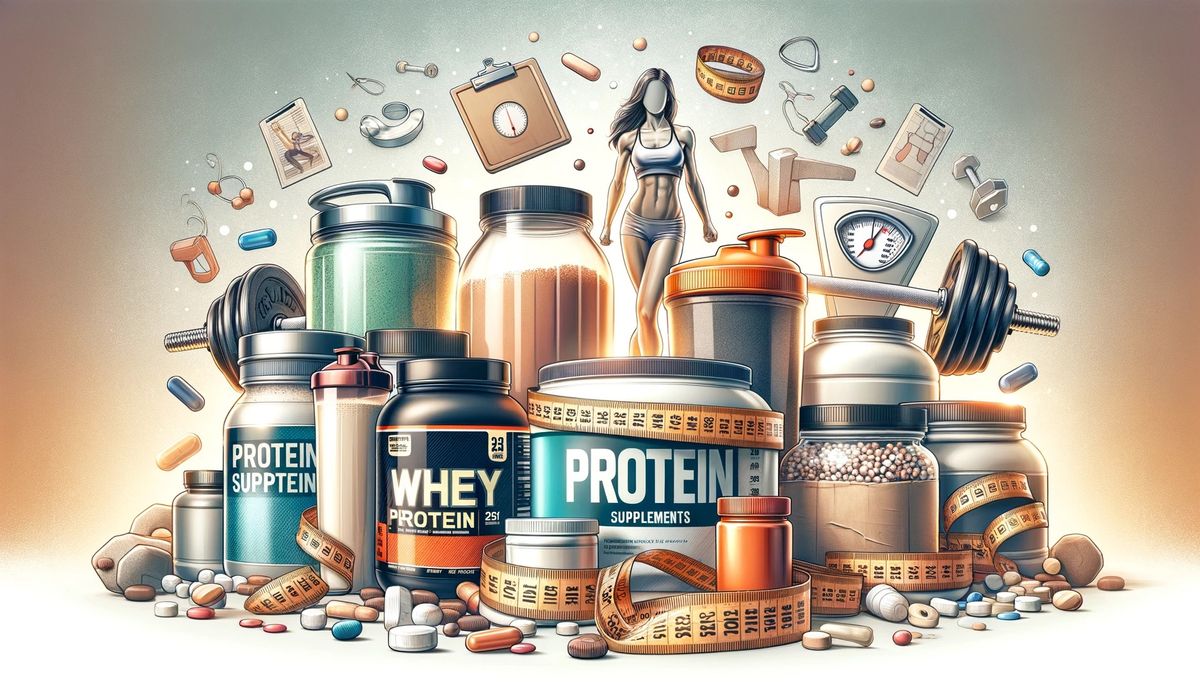
For individuals looking to reach their weight loss goals while developing their muscles and strength, protein supplements can be an excellent choice.
The Mayo Clinic suggests that those preparing for endurance events and who lift weights often should aim for 1.2–1.7 grams of protein per kilogram of body weight per day*. Therefore, a 100-kg individual may require up to 170 grams of protein daily. Even if you eat lots of high-protein foods (e.g., meat, fish), hitting your daily protein needs can be challenging without dietary supplements, especially if you're restricting your calorie intake.
Below, we take a look at popular milk- and plant-based protein supplements in terms of their macronutrients and calories to determine which are the most suitable for weight management.
Milk-Based Protein Powders
There's extensive research supporting the digestibility (1) of milk-based protein powder supplements as well as their capacity to improve body composition (2), increase muscle strength and size (3), and promote recovery (4).
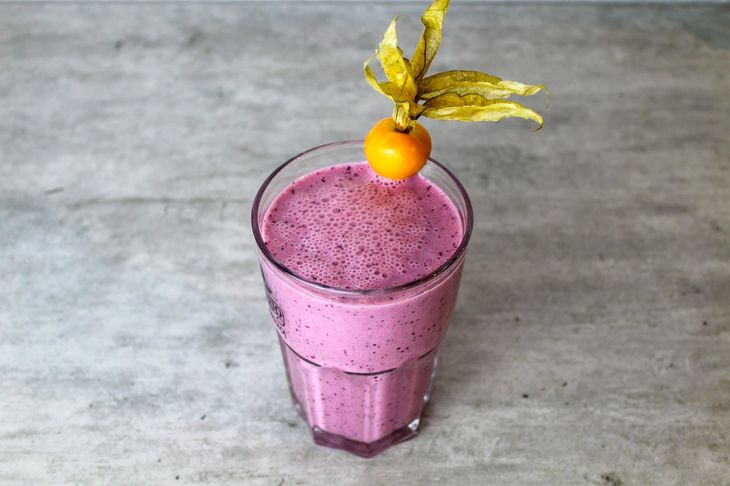
Research also suggests that milk-based protein powders can help regulate blood sugar levels (5), helping you to avoid extreme highs and lows in energy. The effectiveness of milk-based protein powders is partially due to their being complete sources of protein with a good balance of essential amino acids (6).
Let's look at the two main types of milk-based protein powders: whey protein powder and casein protein powder.
Whey and Casein Protein Powders
Whey protein powders—often thought of as the "gold standard"—can be divided into whey protein concentrates and whey protein isolates, with the latter type tending to have more protein.
For instance, per 100 grams, Myprotein's whey protein concentrate has 75 grams of protein, and their whey protein isolate has 81 grams. Similarly, per 100 grams, the whey protein concentrate from Bodybuilding Warehouse has 80 grams of protein, and their whey protein isolate has 95 grams. However, while Myprotein's casein protein powder has more protein (82 grams per 100 grams) than their whey proteins, the casein powder from Bodybuilding Warehouse has less (74 grams per 100 grams).
Table 1 shows how these three protein powders compare in regard to their other macronutrient and their calories.
Table 1. Calories and Macronutrients (grams) per 100 grams of Myprotein (MP) and Bodybuilding Warehouse (BW) Milk-Based Protein Powders
| Calories | Protein | Carbs | Fats | |
| MP Whey Concentrate | 381 | 75.0 | 5.9 | 6.3 |
| MP Whey Isolate | 359 | 81.0 | 4.6 | 1.1 |
| MP Casein | 350 | 82.0 | 4.7 | 1.2 |
| BW Whey Concentrate | 375 | 80.0 | 4.7 | 5.7 |
| BW Whey Isolate | 374 | 90.3 | 1.0 | 1.0 |
| BW Casein | 375 | 77.7 | 13.1 | 1.1 |
As you can see in Table 1, Myprotein's casein powder has fewer calories than the other options, whereas the whey isolate from Bodybuilding Warehouse has the most protein. Therefore, the former may be preferable if your priority is losing weight, while the latter might be better if your priority is maintaining or developing muscle and strength. However, whey concentrates are often substantially cheaper than the other choices and are quite similar in terms of calories and protein, so they would be a great option if you're looking for a protein supplement to enhance your physique that isn't going to cost you too much.
If you're not sure which to go for, you could pick one of these small and inexpensive samples from Myprotein:
They don't seem to have a casein sample, but at the time of writing, you can get a small (1 kg) bag for less than £20.
Myprotein's third-party testing is completed by Labdoor. Their whey protein isolate is currently ranked first for quality among supplement providers. Reflecting this, their whey protein isolate customer reviews page shows over 4,000 5-star reviews.
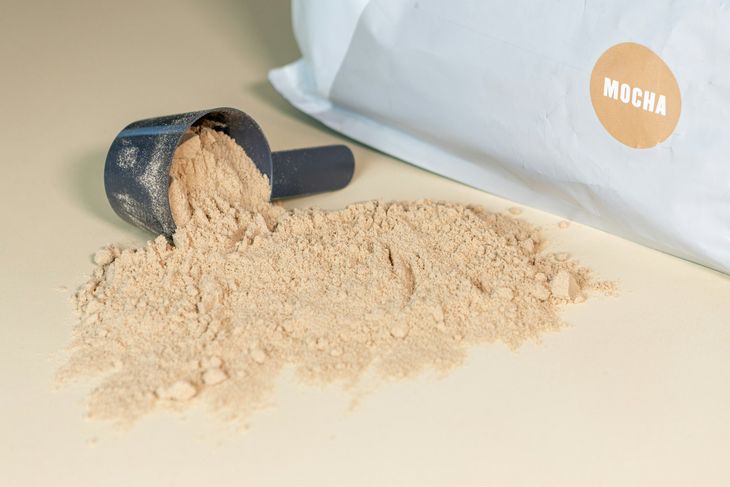
As well as protein powders, milk-based protein products can also be used to make meal replacement shakes.
If you know that on a typical day you will consume one or more unhealthy, high-calorie meals, you could consider occasionally replacing these with a meal replacement shake to help you get into a calorie deficit (i.e., when your energy expenditure exceeds the energy you consumed, leading to fat loss). In addition to being low in calories, meal replacement powders tend to be fortified with other essential nutrients.
For example, Myprotein's meal replacement has just 200 calories per serving, while still providing 18 grams of protein, lots of fibre, and a wide range of vitamins and minerals.
Plant-Based Protein Powders
If you need to avoid dairy products due to lactose intolerance or you follow a plant-based diet, you could instead get yourself a plant-based protein powder. Let's take a look at the most popular plant-based proteins: Soy protein, pea protein, rice protein, hemp protein, and plant-based blends. At the end of this section, you'll find a table (Table 2) showing you how all of these compare in terms of their macronutrient profiles and calories to help you decide which is the best protein powder for you.
Soy Protein Powders
As suggested by the name, soy protein powders are derived from soybeans.
As well as proving a complete source of protein (7), they usually pack a lot of protein per serving. For instance, both Myprotein's soy protein isolate and the equivalent from Bodybuilding Warehouse provide 90 grams of protein per 100 grams.
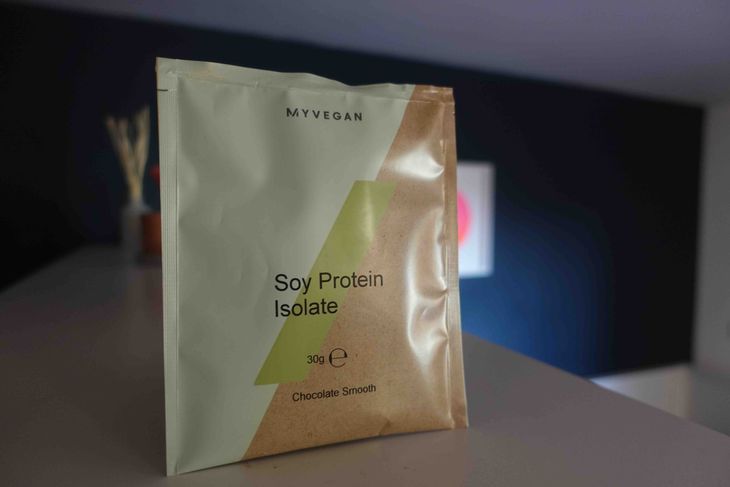
A sample of Myprotein's soy protein isolate.
Among the potential benefits of combining soy protein and resistance training is an elevated resting metabolic rate (8; i.e., it may help you to burn calories even when you're not exercising).
Note that the flavoured versions of the soy protein isolates from Myprotein contain artificial sweeteners (specifically, sucralose). While an article by a registered dietitian at the Cleveland Clinic argues that there's no evidence that sucralose causes any harm, if you'd like to avoid artificial sweeteners, you could opt for the unflavoured version. Currently, Bodybuilding Warehouse seems to only have an unflavoured version, which doesn't have artificial sweeteners or added sugar.
Pea Protein Powders
Besides being a little low in the amino acid methionine, pea protein powders represent a relatively complete source of protein. This means that they have a good balance of essential amino acids, including branched-chain amino acids (BCAAs), which have been studied extensively in relation to enhancing performance in athletes. Comparable to their milk-based counterparts, Myprotein's pea protein isolate and Bodybuilding Warehouse's equivalent product provide 80 grams of protein per 100 grams, so both are great options if you're trying to promote lean muscle mass.
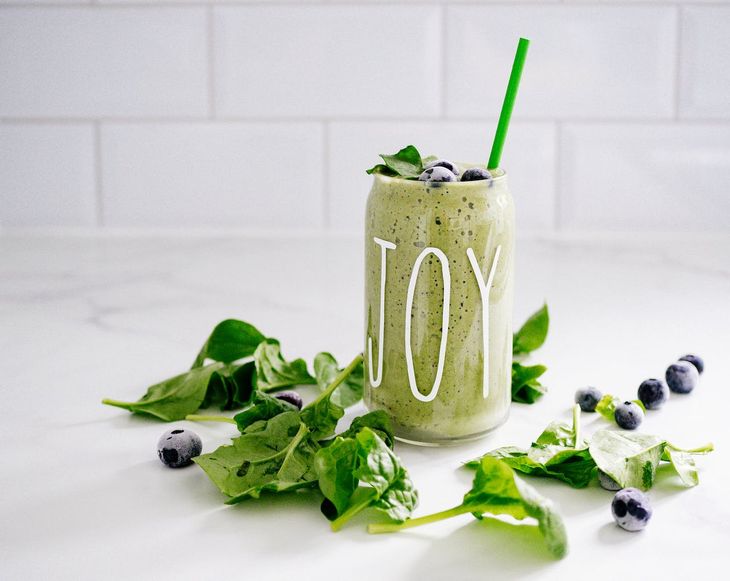
Rice Protein Powders
Rice protein powders can also provide as much protein as milk-based proteins, and there's evidence that they can help maintain stable blood sugar levels (9). Per 100 grams, Myprotein's brown rice protein powder has 78 grams of protein, and Bodybuilding Warehouse's version has 80 grams. Therefore, both could be very useful if you're trying to follow a high-protein diet while on your weight loss journey.
You might also like our article comparing brown rice and pea protein powders.
Hemp Protein Powders
As well as being a complete protein source, hemp proteins contain fatty acids, which are important for the health of your joints. In terms of the amount of protein hemp powders provide, Bodybuilding Warehouse's Pure Hemp 50 Protein Powder has 47 grams of protein per 100 grams or about 14 grams per 30-gram serving. However, with over 400 calories per 100 grams, it contains more energy than the other most popular protein powders, so might not be ideal for those focused primarily on reducing their body fat.
You might also like our article comparing hemp and pea protein supplements.
Plant-Based Protein Powder Blends
For those focused on simultaneous muscle growth and fat mass reduction, plant-based blends that combine a variety of natural ingredients can also represent a convenient way of achieving a higher protein intake. Myprotein's vegan protein blend combines pea and fava bean proteins to provide 74 grams of protein per 100 grams. The Bulk Protein Company's vegan protein (available at the Bodybuilding Warehouse), on the other hand, combines hemp, pea, and soy proteins, and provides 71 grams of protein per 100 grams.
Table 2. Calories and Macronutrients (grams) per 100 grams of Myprotein (MP) and Bodybuilding Warehouse (BW) Plant-Based Protein Powders
| Calories | Protein | Carbs | Fats | |
| MP Soy Protein Isolate | 360 | 90.0 | 1.8 | 1.5 |
| MP Pea Protein Isolate | 388 | 80.0 | 2.6 | 5.5 |
| MP Rice Protein Powder | 423 | 78.0 | 3.8 | 2.1 |
| MP Vegan Blend | 366 | 71.0 | 11.0 | 2.5 |
| BW Soy Protein Isolate | 368 | 90.0 | 6.0 | 1.0 |
| BW Pea Protein Isolate | 395 | 80.0 | 3.0 | 6.0 |
| BW Rice Protein Powder | 366 | 80.0 | 3.5 | 3.5 |
| BW Pure Hemp 50 | 406 | 47.0 | 16.0 | 13.0 |
| BW Vegan Blend | 337 | 71.0 | 6.5 | 2.5 |
As you can see in the table above, Myprotein's soy protein isolate comes first in terms of protein content and has the least calories per 100 grams out of the different protein powders considered here. Therefore, it appears to be particularly suitable for those looking to avoid weight gain while still consuming enough protein to support muscle protein synthesis.
If you'd like to try a small amount of a plant-based protein before committing to one, you could pick up one of these samples:
- Myprotein soy protein isolate sample
- Myprotein pea protein isolate sample
- Myprotein vegan blend sample
At the time of writing, Myprotein doesn't have a rice protein sample, though you can pick up a 1-kg bag for a little over £10.
Protein Bars and Snacks
Even the best protein shakes can lose their appeal after a while. When that happens, a great way of still getting some extra protein is by making the most of the wide variety of readymade high-protein bars and snacks.
Milk-Based Protein Bars and Snacks
Myprotein: Myprotein has a wide variety of protein bars, including their layered protein bar, impact protein bar, crispy layered bar, protein break bar, and breakfast layered bar. See Table 3 below to check out how these bars compare in regard to their calories and macros.
Table 3. The Calories and Macronutrients in Myprotein's Milk-Based Protein Bars
| Calories per 100g | Protein (g per 100g) | Carbs (g per 100g) | Fats (g per 100g) | |
|---|---|---|---|---|
| Layered Protein Bar | 354 | 33 | 34 | 10 |
| Impact Protein Bar | 357 | 31 | 32 | 13 |
| Crispy Layered Bar | 353 | 27 | 37 | 15 |
| Protein Break Bar | 526 | 16 | 37 | 39 |
| Breakfast Layered Bar | 423 | 26 | 32 | 21 |
As you can see in the table, the crispy layered bar has the least calories per 100 grams of all the protein bars, so it may be particularly suitable for those on a higher protein diet looking to capitalise on their weight loss efforts.
As well as protein bars, Myprotein has numerous other protein-based snacks that could form part of a balanced diet that's high in protein and low in calories, such as wafers, brownies, cookies, pop rolls, oat bakes, and flapjacks.
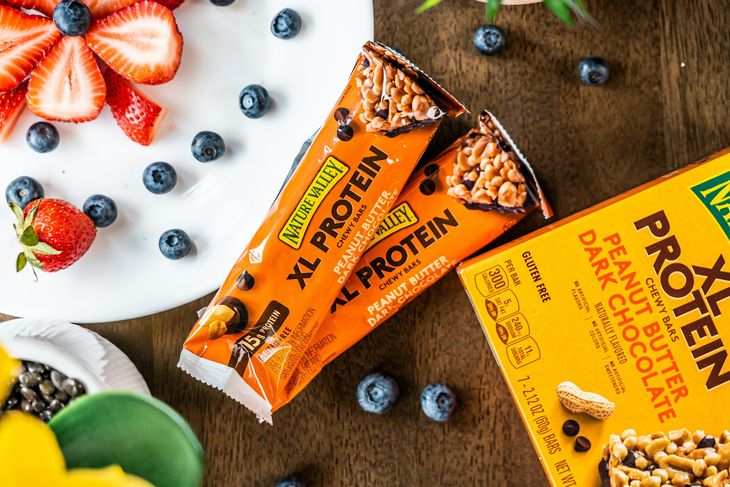
Grenade: Like Myprotein, Grenade offers various protein bars, including their Oreo protein bar, chocolate chip cookie dough protein bar, peanut butter and jelly protein bar, fudged up protein bar, and white chocolate salted peanut protein bar. Table 4 below shows how these compare in terms of their calories and macros.
Table 4. The Calories and Macronutrients in Grenade's Milk-Based Protein Bars
| Supplement Type | Calories per 100g | Protein (g per 100g) | Carbs (g per 100g) | Fats (g per 100g) |
|---|---|---|---|---|
| Oreo Protein Bar | 389 | 35 | 34 | 17 |
| Chocolate Chip Cookie Dough Bar | 353 | 34 | 34 | 13 |
| Peanut Butter and Jelly Bar | 384 | 34 | 33 | 17 |
| Fudged Up Protein Bar | 387 | 34 | 29 | 17 |
| White Chocolate Salted Peanut Bar | 403 | 33 | 32 | 20 |
As you'll see in the table above, Grenade's Chocolate Chip Cookie Dough Bar has the fewest calories per 100 grams, so it could be a useful addition to a healthy diet geared towards hitting your recommended dietary allowance of protein.
Plant-based Protein Bars and Snacks
Myprotein also have a couple of plant-based protein bars: a vegan carb crusher (comprised of pea, rice, and soy proteins) and a pea-nut square (comprised of nut, pea, and rice proteins). Additionally, they have a vegan double dough brownie and a vegan gooey filled cookie. Table 5 shows how these compare in regard to their calories and macros.
Table 5. The Calories and Macronutrients in Myprotein's Plant-Based Protein Bars and Snacks
| Supplement Type | Calories per 100g | Protein (g per 100g) | Carbs (g per 100g) | Fats (g per 100g) |
|---|---|---|---|---|
| Vegan Carb Crusher | 394 | 27 | 31 | 17 |
| Pea-Nut Square | 466 | 24 | 27 | 27 |
| Vegan Double Dough Brownie | 403 | 21 | 42 | 15 |
| Vegan Gooey Filled Cookie | 330 | 18 | 49 | 11 |
As shown in the table, Myprotein's vegan gooey filled cookie has the fewest calories per 100 grams, so could be a good choice for fitness enthusiasts focused on weight loss.
You might also like to check out our article comparing protein bars with protein powders.
Whole Foods That Provide Complete Proteins
While it's great to be able to make your own protein shake or to have a ready-made snack to ensure you have sufficient protein to recover from your physical activity, it's important to get dietary protein from whole foods to benefit from the additional nutrients that they provide.
Which foods are optimal for you will depend on your specific dietary needs, but meats and eggs are good animal sources of protein. For example, if you're focused on losing weight, then lean meats like turkey and chicken are good options. A 100-gram serving of chicken breast typically provides about 31 grams of protein and contains just 165 calories. Similarly, 100 grams of turkey breast usually provides about 30 grams of protein and contains just 147 calories. Therefore, either of these could represent an easy way of upping your protein intake without increasing your caloric intake too much.
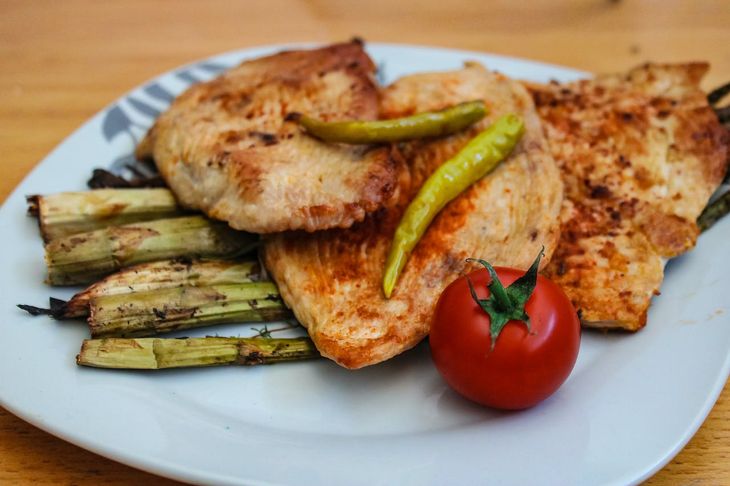
For those following a vegan diet, good plant-based sources of protein include seitan (about 25 grams of protein per 100), lentils (about 9 grams of protein per 100), and beans (about 9 grams of protein per 100). For ideas about how to use ingredients like these, check out our delicious, high-protein plant-based snacks.
Other Considerations
You should think about seeking medical advice before implementing substantial changes to your diet. Reflecting the importance of this, clinical trials suggest that high-protein diets may entail negative effects for those with conditions like metabolic syndrome (Ferraz-Bannitz).
Conclusion
With so many different types of protein powders and supplements, knowing which is ideal for you can be challenging. However, we hope this article has given you some insights into how the most popular protein supplements compare with respect to their calories and macros. If you're still not sure which supplements you'd like to try, check out our top picks below.
Our top picks:
Best milk-based protein powder for weight loss: Myprotein's casein protein powder
Best plant-based protein powder for weight loss: Myprotein's soy protein isolate
Best milk-based protein bar for weight loss from Myprotein: Crispy Layered Bar
Best milk-based protein bar for weight loss from Grenade: Chocolate Chip Cookie Dough Bar
Best plant-based protein snack for weight loss: Vegan Gooey Filled Cookie
If you'd like further guidance on how to reach your weight loss goals, you could reach out to a certified personal trainer within our large database of UK fitness professionals.
Since you're interested in protein supplements, you might also like our articles on soy, pea and whey protein supplements, whey and plant proteins for bodybuilders, essential amino acids and protein, mass gainers and whey protein, the best protein supplements for seniors, the best protein supplements for diabetics, how whey and hemp protein compare, how whey and casein proteins compare, how egg and whey proteins compare, how creatine compares to whey protein, and how whey protein and BCAAs compare.
About the Author
Dave Robinson is a co-founder of ukfitness.pro and has a background in psychology (BSc) and neuroscience (MSc, PhD). As well as strength training, he enjoys endurance challenges and has completed marathons and ultramarathons, cycled across several countries, and completed the Three Peaks Challenge. When writing, he draws on scientific evidence to understand the pros and cons of different diets, supplements, and training regimes.
Footnotes
*Men's Health also has information about how much protein to consume based on your lean body mass, as do the US Food and Drug Administration and the American Heart Association.
References
1. Almeida, C. C., Monteiro, M. L. G., da Costa-Lima, B. R. C., Alvares, T. S., & Conte-Junior, C. A. (2015). In vitro digestibility of commercial whey protein supplements. LWT - Food Science and Technology, 61(1), 7-11. https://doi.org/10.1016/j.lwt.2014.11.038
2. Flaim, C., Kob, M., Di Pierro, A. M., Herrmann, M., & Lucchin, L. (2017). Effects of a whey protein supplementation on oxidative stress, body composition and glucose metabolism among overweight people affected by diabetes mellitus or impaired fasting glucose: A pilot study. The Journal of Nutritional Biochemistry, 50, 95–102. https://doi.org/10.1016/j.jnutbio.2017.05.003
3. Park, Y., Park, H. Y., Kim, J., Hwang, H., Jung, Y., Kreider, R., & Lim, K. (2019). Effects of whey protein supplementation prior to, and following, resistance exercise on body composition and training responses: A randomized double-blind placebo-controlled study. Journal of exercise nutrition & biochemistry, 23(2), 34–44. https://doi.org/10.20463/jenb.2019.0015
4. Buckley, J. D., Thomson, R. L., Coates, A. M., Howe, P. R., DeNichilo, M. O., & Rowney, M. K. (2010). Supplementation with a whey protein hydrolysate enhances recovery of muscle force-generating capacity following eccentric exercise. Journal of science and medicine in sport, 13(1), 178–181. https://doi.org/10.1016/j.jsams.2008.06.007
5. Smith, K., Taylor, G. S., Brunsgaard, L. H., Walker, M., Bowden Davies, K. A., Stevenson, E. J., & West, D. J. (2022). Thrice daily consumption of a novel, premeal shot containing a low dose of whey protein increases time in euglycemia during 7 days of free-living in individuals with type 2 diabetes. BMJ open diabetes research & care, 10(3), e002820. https://doi.org/10.1136/bmjdrc-2022-002820
6. Hoffman, J. R., & Falvo, M. J. (2004). Protein - Which is Best? Journal of sports science & medicine, 3(3), 118–130.
7. Michelfelder A. J. (2009). Soy: a complete source of protein. American family physician, 79(1), 43–47.
8. Aristizabal, J. C., Freidenreich, D. J., Volk, B. M., Kupchak, B. R., Saenz, C., Maresh, C. M., Kraemer, W. J., & Volek, J. S. (2015). Effect of resistance training on resting metabolic rate and its estimation by a dual-energy X-ray absorptiometry metabolic map. European journal of clinical nutrition, 69(7), 831–836. https://doi.org/10.1038/ejcn.2014.216
9. Tan, S. Y., Siow, P. C., Peh, E., & Henry, C. J. (2018). Influence of rice, pea and oat proteins in attenuating glycemic response of sugar-sweetened beverages. European journal of nutrition, 57(8), 2795–2803. https://doi.org/10.1007/s00394-017-1547-3